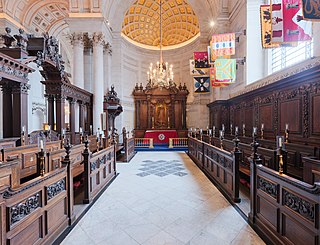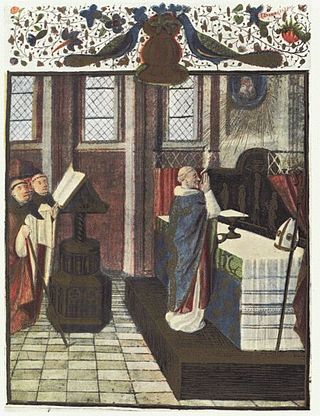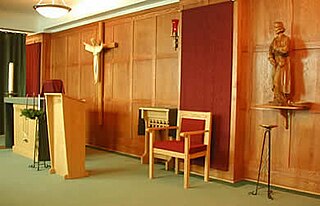Anglicanism is a Western Christian tradition that has developed from the practices, liturgy, and identity of the Church of England following the English Reformation, in the context of the Protestant Reformation in Europe. It is one of the largest branches of Christianity, with around 110 million adherents worldwide as of 2001.

The Eucharist, also known as Holy Communion, the Lord's Supper, and the Blessed Sacrament, refers to both a Christian rite that is considered a sacrament in most churches and the outcome of that rite. Christians believe that the rite was instituted by Jesus at the Last Supper, the night before his crucifixion, giving his disciples bread and wine. The elements of the Eucharist, sacramental bread and wine, are consecrated on an altar or a communion table and consumed thereafter. The bread and wine are associated with the body and blood of Christ, respectively, though Christian theologies differ about exactly if, how, where, and when Christ is present. Passages in the New Testament state that he commanded them to "do this in memory of me" while referring to the bread as "my body" and the cup of wine as "the blood of my covenant, which is poured out for many". According to the Synoptic Gospels this was at a Passover meal.

Ecumenism – also called interdenominationalism, transdenominationalism, or ecumenicalism – is the concept and principle that Christians who belong to different Christian denominations should work together to develop closer relationships among their churches and promote Christian unity. The adjective ecumenical is thus applied to any interdenominational initiative that encourages greater cooperation and union among Christian denominations and churches.

A chapel is a Christian place of prayer and worship that is usually relatively small. The term has several meanings. First, smaller spaces inside a church that have their own altar are often called chapels; the Lady chapel is a common type of these. Second, a chapel is a place of worship, sometimes non-denominational, that is part of a building, complex, or vessel with some other main purpose, such as a school, college, hospital, palace or large aristocratic house, castle, barracks, prison, funeral home, cemetery, airport, or a military or commercial ship. Third, chapels are small places of worship, built as satellite sites by a church or monastery, for example in remote areas; these are often called a chapel of ease. A feature of all these types is that often no clergy were permanently resident or specifically attached to the chapel.

Lancaster University Chaplaincy Centre, on the campus of Lancaster University in the United Kingdom brings together the many faith groups represented on the campus and in the wider community.

The Catholic Charismatic Renewal (CCR) is a movement within the Catholic Church that is part of the wider charismatic movement across historic Christian churches.

A military chaplain ministers to military personnel and, in most cases, their families and civilians working for the military. In some cases they will also work with local civilians within a military area of operations.

Cathedral Church of St Michael and St George serves as the Roman Catholic cathedral for the Bishopric of the Forces. Located on Queens Avenue in Aldershot, England, the building was originally intended to be the principal church for the Anglican chaplaincies of the British Army but since 1973 it has been the seat of the Roman Catholic Bishop of the Forces.

The United States Army Chaplain Corps (USACC) consists of ordained clergy of multiple faiths who are commissioned Army officers serving as military chaplains as well as enlisted soldiers who serve as assistants. Their purpose is to offer religious church services, counseling, and moral support to the armed forces, whether in peacetime or at war.

Anglican interest in ecumenical dialogue can be traced back to the time of the Reformation and dialogues with both Orthodox and Lutheran churches in the sixteenth century. In the nineteenth century, with the rise of the Oxford Movement, there arose greater concern for reunion of the churches of "Catholic confession". This desire to work towards full communion with other denominations led to the development of the Chicago-Lambeth Quadrilateral, approved by the Third Lambeth Conference of 1888. The four points were stipulated as the basis for church unity, "a basis on which approach may be by God's blessing made towards Home Reunion":

Anglican devotions are private prayers and practices used by Anglican Christians to promote spiritual growth and communion with God. Among members of the Anglican Communion, private devotional habits vary widely, depending on personal preference and on their affiliation with low-church or high-church parishes.

Holy Trinity Church is an Anglican church in the centre of Guildford, England. A large, red brick building, it was built in the early 1760s on the site of a mediaeval church which collapsed in the mid-18th century. It is the only large Georgian church in Surrey, sporting detailed frescos of the Crucifixion surrounded by the Saints and the Ascended Lord in Heaven, as well as one of the largest unsupported ceilings in southern England. It is a Grade I listed building.

Ad orientem, meaning "to the east" in Ecclesiastical Latin, is a phrase used to describe the eastward orientation of Christian prayer and Christian worship, comprising the preposition ad (toward) and oriens, participle of orior.

The Catholic Diocese of the Australian Military Services, is a military ordinariate of the Roman Catholic Church immediately subject to the Holy See. It was established in 1969 and maintains its Chancery office in Canberra. It is a Diocese in its own right and not governed under any Diocese or Archdiocese.

In 2013, the Royal Military College of Canada is celebrating the 50th anniversary of the two small devotional chapels in Yeo Hall, which were installed in 1963. With a view to encourage and enhance their spiritual well-being, the Protestant and Royal Catholic Chaplains, cadets and staff use the Chapels. Gifts to the chapels have been made by successive generations of cadets and ex-cadets.

The Anglican Church of St. John the Evangelist, also known simply as St. John's, is located in İzmir, Turkey, in the quarter of Alsancak.

St Ursula's Church, Bern is an Anglican Episcopal church in Bern, Switzerland.





















